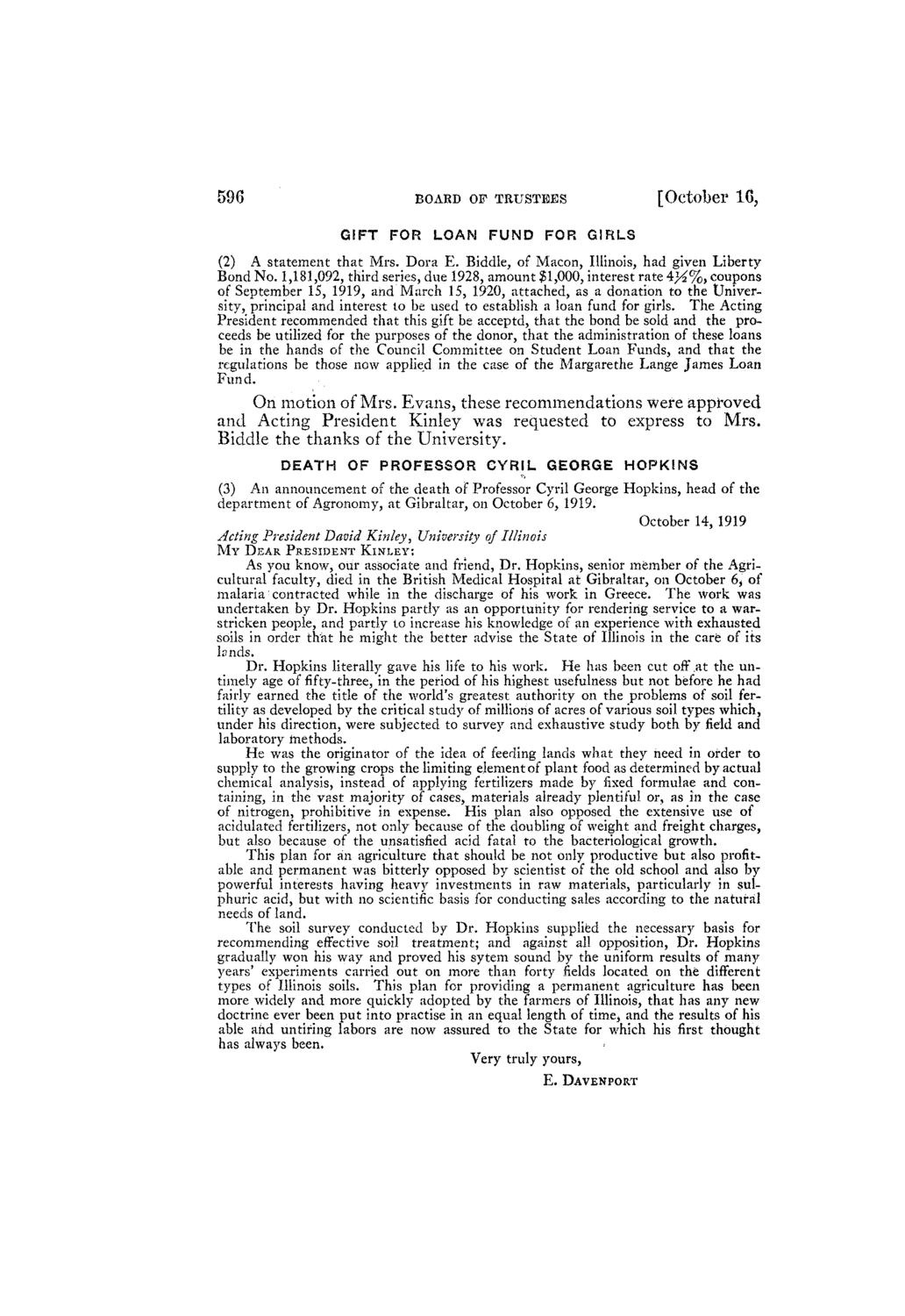| |
| |
Caption: Board of Trustees Minutes - 1920
This is a reduced-resolution page image for fast online browsing.

EXTRACTED TEXT FROM PAGE:
596 BOARD OP TRUSTEES GIFT FOR LOAN FUND FOR GIRLS [October 16, (2) A statement that Mrs. Dora E. Biddle, of Macon, Illinois, had given Liberty Bond No. 1,181,092, third series, due 1928, amount $1,000, interest rate 4 ^ % , coupons of September IS, 1919, and March 15, 1920, attached, as a donation to the University, principal and interest to be used to establish a loan fund for girls. The Acting President recommended that this gift be acceptd, that the bond be sold and the proceeds be utilized for the purposes of the donor, that the administration of these loans be in the hands of the Council Committee on Student Loan Funds, and that the regulations be those now applied in the case of the Margarethe Lange James Loan Fund. On motion of Mrs. Evans, these recommendations were approved and Acting President Kinley was requested to express to Mrs. Biddle the thanks of the University. DEATH OF PROFESSOR CYRIL GEORGE HOPKINS (3) An announcement of the death of Professor Cyril George Hopkins, head of the department of Agronomy, at Gibraltar, on October 6, 1919. October 14, 1919 Acting President David Kinley', University of Illinois M Y DEAR PRESIDENT KINLEY: As you know, our associate and friend, Dr. Hopkins, senior member of the Agricultural faculty, died in the British Medical Hospital at Gibraltar, on October 6, of malaria contracted while in the discharge of his work in Greece. The work was undertaken by Dr. Hopkins partly as an opportunity for rendering service to a warstricken people, and partly to increase his knowledge of an experience with exhausted soils in order that he might the better advise the State of Illinois in the care of its lsnds. Dr. Hopkins literally gave his life to his work. He has been cut off .at the untimely age of fifty-three, in the period of his highest usefulness but not before he had fairly earned the title of the world's greatest authority on the problems of soil fertility as developed by the critical study of millions of acres of various soil types which, under his direction, were subjected to survey and exhaustive study both by field and laboratory methods. He was the originator of the idea of feeding lands what they need in order to supply to the growing crops the limiting element of plant food as determined by actual chemical analysis, instead of applying fertilizers made by fixed formulae and containing, in the vast majority of cases, materials already plentiful or, as in the case of nitrogen, prohibitive in expense. His plan also opposed the extensive use of acidulated fertilizers, not only because of the doubling of weight and freight charges, but also because of the unsatisfied acid fatal to the bacteriological growth. This plan for an agriculture that should be not only productive but also profitable and permanent was bitterly opposed by scientist of the old school and also by powerful interests having heavy investments in raw materials, particularly in sulphuric acid, but with no scientific basis for conducting sales according to the natural needs of land. The soil survey conducted by Dr. Hopkins supplied the necessary basis for recommending effective soil treatment; and against all opposition, Dr. Hopkins gradually won his way and proved his sytem sound by the uniform results of many years' experiments carried out on more than forty .fields located on the different types of Illinois soils. This plan for providing a permanent agriculture has been more widely and more quickly adopted by the farmers of Illinois, that has any new doctrine ever been put into practise in an equal length of time, and the results of his able and untiring labors are now assured to the State for which his first thought has always been. Very truly yours, E. DAVENPORT
| |